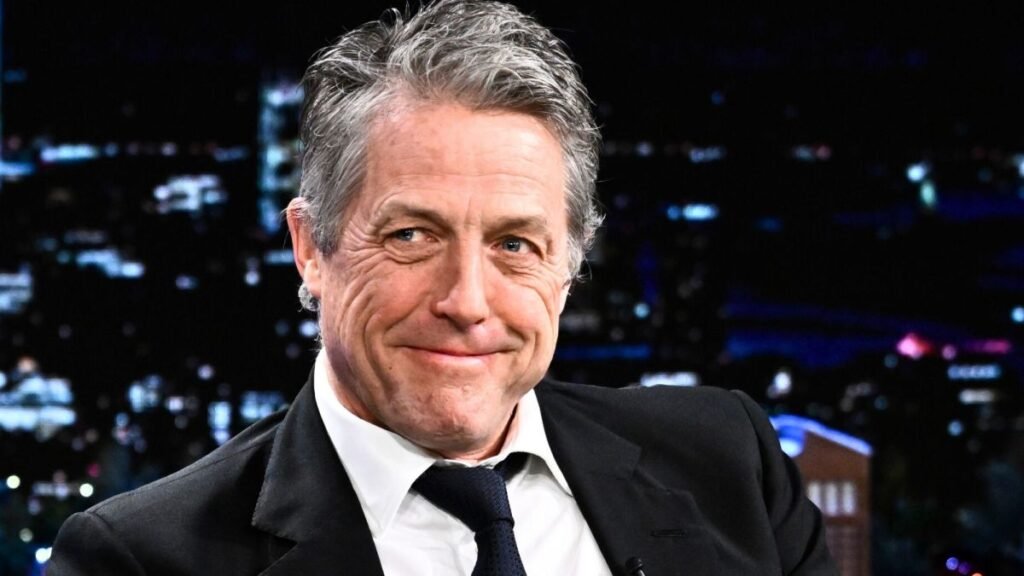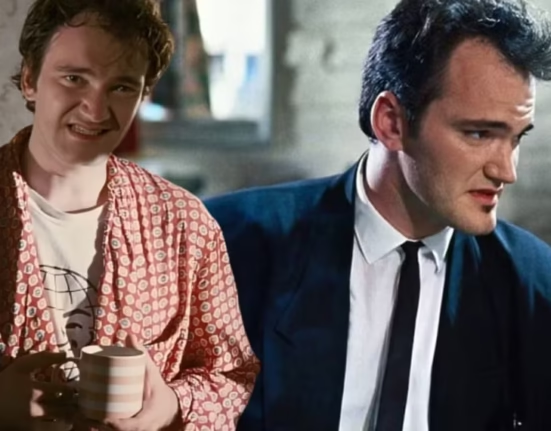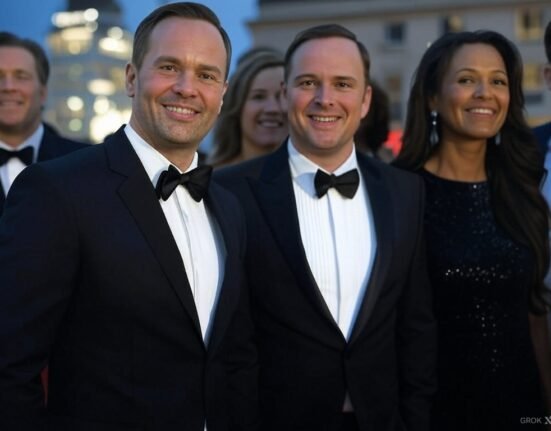
Introduction: Unveiling ‘Heretic’
‘Heretic’ is an upcoming horror thriller that has already garnered significant attention, particularly due to its compelling premise and the involvement of acclaimed actor Hugh Grant. The film intertwines themes of atheism and fear, presenting a unique narrative that invites viewers to ponder deep philosophical questions while navigating the tension of a supernatural experience. Grant portrays a protagonist whose firm beliefs are put to the test as unsettling events begin to unfold, throwing his previously solid worldview into disarray.
The crux of ‘Heretic’ revolves around the main character, an avowed atheist, who confronts the unexplainable and terrifying phenomena that challenge his lack of faith. This narrative choice serves not only to enhance the suspense typical of horror films but also to delve into the psychological dimensions of belief and doubt. Atheism, often perceived as a rejection of the supernatural, comes to the forefront as the character grapples with the implications of his disbelief while facing surreal occurrences that directly contradict his understanding of reality.
As the tension escalates, the film masterfully combines elements of horror with existential inquiry, providing audiences with an engaging cinematic experience that is both thrilling and thought-provoking. The acute fear of the unknown and the struggle between skepticism and belief create a unique lens through which the themes of the film are explored. With its set digital streaming release, ‘Heretic’ promises to captivate audiences while igniting discussions about the nature of faith, fear, and the supernatural.
The Plot: A Journey into Darkness
‘Heretic’ unfolds in a gripping narrative that expertly weaves together themes of atheism and horror, presenting a protagonist whose skepticism is tested in the face of supernatural challenges. Hugh Grant portrays Jonathan, a rational man who embarks on a seemingly ordinary journey to unravel unsettling occurrences in a small town, only to find himself drawn into a chilling web of secrets. As the storyline evolves, we witness Jonathan navigate through the complexities of his disbelief, which is increasingly challenged by tangible manifestations of fear and dread.
The film sets the stage with Jonathan’s initial skepticism regarding faith, highlighting his intellectual approach to life. However, as bizarre incidents begin to plague the town and personal tragedies unfold, his steadfastness is put to the ultimate test. The narrative effectively utilizes suspense, with key events that include mysterious symbols appearing in the town, unexplained phenomena befuddling even the most rational minds, and encounters with a shadowy figure that seem all too real. These elements serve to amplify Jonathan’s internal conflict, forcing him to confront not just the external horrors, but also his own convictions.
Throughout the film, character development is paramount. Jonathan’s descent into doubt mirrors the escalating tension, leading him to question the very fabric of his understanding of life. The plot artfully explores how fear can lead one to confront the darkest corners of existence. As he interacts with residents gripped by terror and hysteria, we see Jonathan pushed to reconcile his atheism with the inexplicable. The climax of ‘Heretic’ propels viewers into a thrilling resolution that promises to leave a lasting impact, not just through its storyline but through the philosophical reflections it evokes regarding belief and skepticism in a world fraught with fear.
Character Analysis: Hugh Grant’s Role
In the upcoming horror thriller ‘Heretic’, Hugh Grant portrays a complex character that challenges the boundaries of belief and fear. His role as an outspoken atheist forms the crux of the narrative, presenting a fresh perspective in a genre often populated by the supernatural and religious undertones. Grant excels in detailing the psychological turmoil faced by his character as he navigates a series of extraordinary and terrifying events that force him to confront both his beliefs and his deepest fears.
Grant’s acting range shines as he meticulously conveys the internal conflict of a man who has spent his life dismissing the supernatural. The character’s journey begins with a staunch disbelief in anything beyond the material world, representing a rational stance that is gradually shattered by the film’s increasingly bizarre occurrences. The portrayal is layered, revealing a vulnerability that contrasts sharply with the character’s initial bravado. This remarkable depth captivates the audience, making them empathize with his plight even as they are drawn into the chilling atmosphere of the film.
The motivations driving Grant’s character are multifaceted. At the onset, he embodies a skepticism that many viewers may find relatable, rooted in a desire for logic in an illogical world. However, as the narrative unfolds, the terrifying experiences catalyze a crisis of faith, prompting a reevaluation of what is real versus what is imagined. The character’s arc raises poignant questions regarding the nature of belief, ultimately grappling with existential dread that resonates on a personal level. Hugh Grant’s nuanced performance challenges the audience to reconsider their own perceptions of atheism and fear, culminating in an engaging exploration of the human psyche amidst unsettling circumstances.
Themes and Motifs: Atheism and Fear
‘Heretic,’ starring Hugh Grant, delves into the profound themes of atheism and fear, presenting a landscape where belief and disbelief collide dramatically. Central to the narrative is the exploration of atheism, embodied by characters who grapple with the absence of faith in a world riddled with existential threats. The film critiques the traditional ideals surrounding religion, prompting audiences to consider the implications of a life devoid of spiritual conviction. Through its unsettling atmosphere, ‘Heretic’ invites viewers to confront their own beliefs and the fears that stem from uncertainty.
The juxtaposition between atheism and fear serves as a powerful motif throughout the story. Characters experience visceral fear—not just of the supernatural but also of the moral vacuity that can accompany a lack of belief. This fear becomes a catalyst that drives the plot forward, as individuals, stripped of religious frameworks, navigate the terror of the unknown. The absence of faith often leads to existential crises, pushing characters into harrowing scenarios that expose their vulnerabilities. The narrative weaves a complex tapestry where fear is not merely a reaction but a fundamental aspect of the human condition in an atheistic worldview.
Cinematography and Visuals: Creating an Atmosphere of Terror
The cinematography in Hugh Grant’s horror thriller ‘Heretic’ plays a pivotal role in establishing and maintaining an atmosphere of terror throughout the film. The filmmakers have creatively employed a variety of visual elements to effectively convey the themes of fear and doubt that underpin the narrative. One of the most notable techniques used is the strategic manipulation of lighting. Low-key lighting, combined with stark contrasts, generates an unsettling ambience that amplifies the tension and creates a sense of uncertainty about what lurks in the shadows.
Furthermore, the filmmakers utilize innovative camera angles to disorient the audience and capture the characters’ emotional turmoil. For instance, the use of tilted frames and extreme close-ups not only conveys the protagonist’s internal struggles with atheism but also instills a heightened sense of paranoia. This choice in perspective enables the audience to engage with the characters on a deeper level while immersing them in the film’s eerie landscape.
The color palette in ‘Heretic’ further complements the overall tone of dread. By utilizing muted earth tones interspersed with splashes of vibrant color during climactic moments, the cinematographers effectively accentuate feelings of anxiety. The deliberate choice of colors serves to symbolize the conflict between faith and doubt, inviting viewers to reflect on the larger themes of the film.
In addition, creative visual storytelling is evident in the way scenes are framed and composed. The use of negative space around characters fosters a sense of isolation and vulnerability, echoing the film’s exploration of existential fears. As the visual elements come together, they not only heighten the horror experience but also invite viewers to contemplate the philosophical questions surrounding belief and skepticism. This careful orchestration of cinematography results in a hauntingly beautiful film that lingers in the minds of its audience long after the credits roll.
Director’s Vision: Crafting the Unease
The director of ‘Heretic’ has embarked on a profound journey to deliver a horror thriller that not only entertains but also provokes thought regarding atheism and existential fears. Their creative vision revolves around an intricate balance of atmosphere and character-driven storytelling, ensuring that the film resonates on multiple levels. The director meticulously structured the narrative, generating a sense of unease that lingers well beyond the film’s conclusion. This approach is essential, especially in the horror genre, where the most effective tension derives from the emotional depth of characters rather than mere jump scares.
In crafting ‘Heretic’, the director drew influence from a variety of sources, including classic horror films that explore themes of doubt and belief. They have inserted subtle nods to these inspirations throughout the film, enriching the viewing experience for cinephiles while maintaining accessibility for a broader audience. The choice of locations was particularly deliberate; each setting was designed to reflect the internal conflict of the characters, fostering an ominous atmosphere that captivates viewers. The eerie silence of desolate landscapes contrasts sharply with the emotional turmoil depicted on screen, drawing the audience deeper into the narrative.
To amplify the overall tension, the director implemented a unique pacing strategy. By carefully controlling the rhythm of scenes, they enhance moments of suspense and intimacy. This deliberate pacing allows viewers to immerse themselves in the characters’ struggles, engaging with themes of faith, fear, and the unknown. Moreover, attention to performances has been paramount; the director collaborated closely with actors, creating an environment where they could explore the psychological complexities of their roles. This collaboration ensured that every performance felt authentic, grounding the horror in relatable emotions. Through skillful direction, ‘Heretic’ serves not only as a thrilling experience but also as a reflection on deeper existential questions, solidifying its place in contemporary horror cinema.
Reception and Anticipation: Audience Expectations
Hugh Grant’s upcoming horror thriller ‘Heretic’ has generated significant buzz ahead of its digital release, which has led to heightened expectations among audience members and critics alike. This film, engaging with themes of atheism and existential fear, has cultivated curiosity through its strategically released trailers and teasers. Feedback from these promotional materials suggests that viewers are intrigued by the intricate blend of philosophical inquiry and genre elements presented in the narrative.
Initial reception from critical previews indicates that ‘Heretic’ may challenge traditional horror conventions, inviting audiences to reflect on deeper themes. The film’s premise has led to the emergence of various fan theories that speculate about the storyline’s direction and character motivations. Many anticipate that Hugh Grant’s involvement will lend a unique authenticity to the portrayal of complex characters, which has sparked engaging discussions in online forums. Audience expectations are further heightened by the track record of Grant in delivering captivating performances, often balancing charm with tension, which seems crucial for a film rooted in fear and moral questioning.
Moreover, the promotional material surrounding ‘Heretic’ effectively highlights the film’s atmospheric settings and spine-tingling narrative arcs. These elements have not only captivated potential viewers but have also contributed to exploring broader themes that resonate with contemporary societal concerns about belief systems and critical thinking. Social media buzz and online platforms have enabled fans to engage actively with the anticipation process, sharing insights and predictions, which reflect a communal excitement about the film’s imminent release. Audiences are eager to delve into ‘Heretic’ and experience how it navigates the intersection of fear and atheism, showcasing a nuanced exploration of human belief and dread.
Comparative Cinema: Similar Films in the Genre
The horror thriller genre has long been a rich tapestry woven with themes surrounding belief, fear, and the supernatural. Hugh Grant’s ‘Heretic’ adds a unique thread to this fabric, inviting comparisons with other notable films that have explored similar thematic territory. One key film that comes to mind is ‘The Witch’ (2015), which delves into the eerie uncertainties of faith and the unseen evils that may lurk within the shadows of human existence. Like ‘Heretic,’ ‘The Witch’ embodies a palpable tension between belief and skepticism, setting a haunting atmosphere that elicits both psychological horror and existential dread.
Another film, ‘Hereditary’ (2018), further underscores the motif of familial ties intertwined with supernatural dread. This film presents a harrowing narrative about grief and loss while drawing upon pagan beliefs and the fear of inherited trauma. The exploration of a family grappling with their dark past offers a poignant reflection on how fear, much like faith, can be passed down through generations. Similar to ‘Heretic,’ the characters in ‘Hereditary’ wrestle with the implications of their beliefs and the terror that accompanies them.
A significant departure, yet thematically resonant, is ‘The Babadook’ (2014), which artfully connects the struggle of a single mother with the manifestations of her fears. In this narrative, the supernatural entity symbolizes repressed grief, highlighting the internal and external conflicts that arise from human emotions. The character-driven exploration of fear plays a crucial role in both ‘The Babadook’ and ‘Heretic’, allowing for a deeper understanding of how psychological turmoil manifests in horrific ways.
In these films, fear often transcends the supernatural, probing into the complexity of human belief systems. Each narrative invites audiences to grapple with their beliefs, leaving them to question the line between faith and fear. This shared exploration places ‘Heretic’ among films that not only entertain but also provoke profound reflections on the human condition.
Conclusion: The Future of Horror with Hugh Grant
Hugh Grant’s foray into the horror genre with ‘Heretic’ marks a significant evolution in his acting career, showcasing his versatility and willingness to embrace darker themes. This film not only challenges his established romantic comedy persona but also introduces complexities surrounding religious beliefs and existential fear, prompting viewers to confront their own perspectives on atheism and morality. The narrative, enveloped in suspense, reflects contemporary societal concerns, making it a relevant piece within the horror thriller landscape.
The implications of ‘Heretic’ extend beyond Grant’s performance; they highlight a potential shift in horror filmmaking. As audiences become increasingly drawn to narratives that dwell on psychological depth and social commentary, filmmakers must adapt to these evolving tastes. The integration of themes such as faith, doubt, and human vulnerability is likely to resonate with viewers on a deeper level, suggesting that future horror thrillers will prioritize substance over mere shock value. This evolution could lead to a hybridization of genres where elements of drama, psychological thriller, and horror intertwine more seamlessly than in past iterations.
Furthermore, Hugh Grant’s ability to navigate this nuanced genre introduces the possibility of established actors embracing unconventional roles, thereby attracting diverse demographics to horror films. As audience preferences shift towards multifaceted characters grappling with profound dilemmas, the horror genre could become a platform for broader discussions about human nature, societal failings, and existential inquiries. The success of ‘Heretic’ may signify an optimistic trajectory for horror films—where fear is not only a primal reaction but also a profound reflection of our times.
















Leave feedback about this